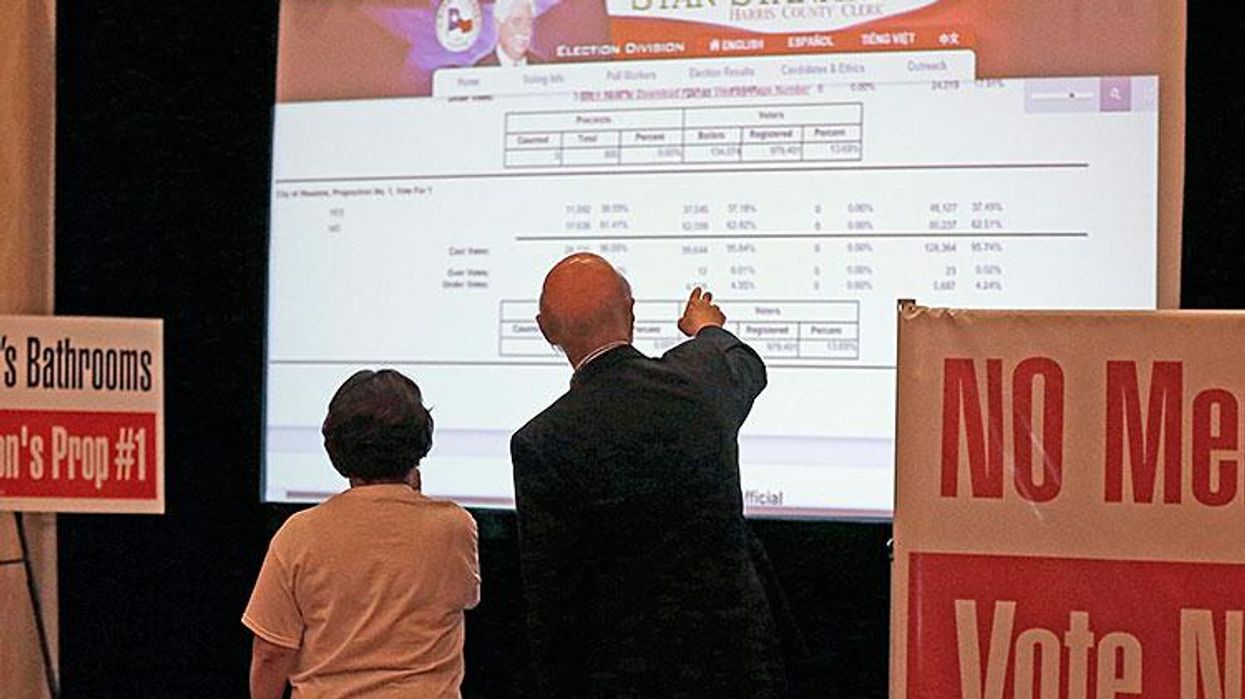
Campaign for Houston supporters check election results at a watch party.
The repeal of the Houston Equal Rights Ordinance was crushing, and it’s vital we know why we lost.
November 06 2015 7:47 AM EST
By continuing to use our site, you agree to our Privacy Policy and Terms of Use.

The repeal of the Houston Equal Rights Ordinance was crushing, and it’s vital we know why we lost.
It's a dangerous myth that Houston was unexpected. National leadership of the LGBTQ movement has known or had very good reasons to suspect that our opponents -- still reeling from their defeat around same-sex marriage -- would seize on trans issues to energize their supporters, refill their treasuries, and create a new opportunity to gain traction with voters and the public at large.
But our funding has been so focused on marriage equality that we were left fighting for the Houston Equal Rights Ordinance without the proper resources for political strategy, organizing, and effective, wide-scale public education. We were caught unprepared and that is inexcusable.
The voters' decision on HERO comes at a pivotal time in our movement and raises key questions for all of us -- especially our leaders -- about what happened, why it happened, and where to go from here. How much and how quickly we learn from this loss depends on whether we, as a movement, engage in an unsparing and rigorous analysis not just of the Houston campaign, but also the ways in which we have and have not prioritized trans issues.
The reaction to the loss itself is telling. Many whose engagement is bounded by the victory of marriage equality and the goal of passing the Equality Act are left shocked. On the other extreme, for those who spend most of their lives working on the "margins" of our community -- the undocumented, the young, people of color, trans folks, and those that hold multiple marginalized identities -- Houston is like a distant rainstorm amid an ongoing level 5 hurricane of profound and pervasive violence and oppression. Identifying how and working toward bridging this divide is part of the crucial work that must occur in order for us to develop a stronger, smarter, and more holistic strategy of how to move forward.
For context, my lens on all of this is informed both my identity as a trans man and by a decade-plus of political experience. Before (finally) coming out as trans, I spent the first decade of my life working (with some success) in the world of elections from city council to presidential campaigns, to independent expenditures, to running multimillion-dollar political programming for labor, and on working at a senior level the C3 side of education campaigns. It is from this vantage point of identity and experience that I offer a few observations that I hope others will consider as we figure out how to move forward together.
First, the fight for same-sex marriage and the subsequent lessons learned are neither perfectly analogous nor completely irrelevant to these fights. But to win on trans issues in the public sphere, we need to make the commitment and investment to define a new set of rules.
It is without question that our most substantive trans victories have so far been through litigation and policy changes outside of the public sphere. The fundamental landscape of trans politics has changed and that change is defined by a broader, quicker and dramatically more public fight. There is no going back. The only question is how we will meet this fight.
The good news is there are many steps we can begin taking now to move forward.
For one, we need to invest in broader, ongoing public education within which the smaller message campaign skirmishes are nested. The political messaging going forward must include a strong and clear rebuttal of the "bathroom" terror.
Further, any idea that including trans narratives in the Houston fight was some sort of naive, do-gooder inclination is what hurt the campaign itself is just plain wrong. Cisgender validators (such as parents of trans children) have a crucial role to play, but not at the exclusion of trans identified individuals. Our opposition has taken the tactical option of hiding trans individuals or drowning out the bathroom argument. Our silence only allows them to dominate and define both. Our choices are around if and how we will be bold enough to proactively and aggressively offer our own narrative.
We must also engage progressive allies in our fights. Labor unions, racial justice groups, reproductive rights groups -- we simply cannot win without their help. The right wing has made an art of using social issues to advance regressive economic agendas. There was a time when LGBTQ equality issues what were a demagogue used to turn out voters needed to pass regressive economic measures. The right will not miss the opportunity to use trans issues in the same manner. Not only is engaging progressive allies the right thing to do, it is the strategic thing to do -- for everyone.
Houston was heartbreaking. The only thing that would be more heartbreaking is if we didn't heed the lessons it offers and the opportunities it lifts up. Donors, movement leaders, pundits, and the like have the opportunity to make a difference. Over the coming months, I hope that leaders will consider: Accepting that trans issues will continue to happen at a broader, more public, and quicker pace. Plan accordingly.
Ensure that these plans include investing in organizations specifically led by trans people to develop the underdeveloped areas of infrastructure these organizations need to win in the changed landscape of trans politics: political strategy, organizing, and conducting an effective, wide-scale public education campaign. In addition, we must fund and support leadership development programs that create a meaningful pipeline to ensure marginalized members of the trans community - people of color, undocumented immigrants, youth, women and others - are positioned to play leadership roles in these organizations.
Mainstream LGBTQ organizations should support these efforts by investing significantly in their own internal education -- of leadership, staff and donors. Further, they should support and follow the lead of trans-led organizations around trans-specific fights. Organizations should be encouraged to be public about the specific level of financial resources they are committing to this work in the context of their other priorities. Funders and donors should hold them accountable for their choices.
Continue to refine messaging in campaign contexts, while including trans messengers. Invest significantly in public education conducted by nonprofits. Invest in developing messages for the C3 nonprofits that represent the full community, including but not limited to people of color, women, gender-expansive folks, and bisexual-identified individuals.
Reach out now to progressive allies such as labor, reproductive rights, and racial justice groups, and not in the "cover our asses," tit-for-tat manner that passes for transformational politics. Invest in a shared analysis and shared strategic planning.
Winning marriage equality took 30 years of losing. Frankly, trans people don't have that long to wait. Literally, lives are on the line. How long it takes is in direct proportion to our willingness as a community to engage in new levels of self-reflection, community transparency, and accountability. The choice is ours.

Charlie Kirk DID say stoning gay people was the 'perfect law' — and these other heinous quotes